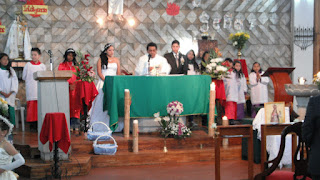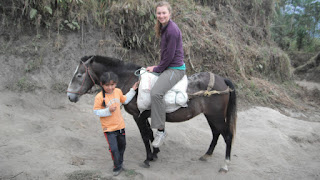I'm back from my 8-day excursion to the Intag cloud forest of
Ecuador! But I’ll start from the beginning, when I arrived in Quito.
My flights from Cusco to Quito went smoothly, and I actually
met 3 other students who are in my program while waiting in line to go through
immigration. We were picked up by our program directors and then taken to a
hostel in downtown Quito, where we would stay for the first week during
orientation. This week was incredibly hectic, with tons of information being
thrown at us and at the same time preparing for the first of our three
ecological excursions of the semester. Additionally, the hurricane in Miami
delayed the flights of nearly half the students, so those arriving on Monday
and Tuesday missed parts of orientation.
On our first full day in Ecuador, we had a “drop-off” in the
city where we all had to explore on our own for 3 hours. The bus system here is
a little more confusing than in Cusco, but I managed to figure it out (sort of)
after a while. We also got placed into our respective Spanish classes after
having interviews. Each class only has between four and six students in it, which
is great for individual attention. Later in the week, our Spanish classes went
on a day-trip up to a reserve in the mountains, where we learned specific
Spanish terminology relating to ecology.
My first meal in Quito - shrimp and rice at a Cevicheria (probably the best meal I've eaten here)
My Spanish class
Even after a week in Quito, I still feel like I don’t know
the city very well (probably because our days were jam-packed with activities
and lectures mostly in the hostel). However, I can definitely say that Cusco
and Quito are two completely different cities. Quito is much larger and more
modern, with tall buildings and a more complex public transportation system. I
also feel like the Incan influence is stronger in Cusco, which can be seen
through the clothing that people wear and the kinds of stores that line the
streets.
On Saturday morning, our group left for the Intag cloud
forest. After 6 hours in a bus, we arrived at La Florida, a farm owned by a
couple from the US who moved to Ecuador about 30 years ago. For the next three
and a half days, we had an incredibly busy schedule of classes/lectures/activities
– all outside! Here’s one example of what a day was like in the cloud forest :
6-8am – bird watching. 8-9am – breakfast. 9-10am – lecture about the cloud
forest. 10-12pm – nature hike. 12-1pm – lecture about mining. 1-2pm – lunch.
2-4pm – botany lessons. 4-6pm – setting up mist nets to catch birds. 6-7pm –
nature drawing class. 7-8pm – dinner. 8-9pm – light trapping insects.
Definitely a busy day, but a nice break from traditional college classes! All
of the food we ate at La Florida was organic and vegetarian, and most of it
came from the farm itself. I got to try a bunch of delicious foods, such as
Peruvian ground cherries, naranjilla juice, and grilled burgers made from green
plantains.
Peruvian ground cherries
Our 'classroom'
Learning how to record birds once we've caught them in the mist nets
Mist netting class
Botany class
Catching dragonflies for my field investigation project
The next three days were spent at rural home stays in a
small village called Plaza Gutierrez, which is an hour and a half walk from La
Florida. Each of us was assigned a different family. I lived with a woman named
Fabiola, her eight-year-old daughter Kati, and Kati’s grandparents. All of the
women in the community are weavers, and use a plant called cabuya to make hats,
bags, belts, etc. They were taught how to weave 16 years ago by an American
woman named Sandy who lives on La Florida. Sandy wanted to give the women (who
didn’t have any professional skills) a trade so that they could better support
their families and become more independent. Since then, the women have formed
an organized group of weavers capable of making a living.
The three days living with the family was interesting and
fun, but different from any experience I’ve had. The whole family sleeps in one
room, and the kitchen consists of a small stove. They have a variety of farm
animals including pigs, chickens, cows, cats, a dog, and a horse. The chickens,
cats, and dog routinely came into the kitchen and would jump/fly onto the table
while we were eating. My host sister went to school in the mornings, and while
she was away, Fabiola and I would do dishes, cook meals, and weave. She taught
me how to make a bag out of cabuya, which was really fun. On one of the
afternoons, Kati and I went for a horseback ride up the mountain and picked
blackberries together. Another afternoon, Fabiola and I met up with another
family to cut plantains, yucca, and lemons with a machete from a farm. It was
really nice to get a glimpse of what this lifestyle is like through
experiencing it for a few days.
My host grandmother spinning cabuya
My host sister and her friends (she's in the orange)
Their yard
Trying to ride a llama....
Crocheting my bag
My host mom and the bag she helped me make
After the home stay (and a horseback ride back to the farm),
our group of students participated in a “minga”, which is a Quechuan word for
an event where everyone in a community works together on something, such as a
barn raising. Whenever we have an excursion somewhere, we always work for a day
doing something the community needs done to give back to the locals. Near La
Florida, we helped with a bridge construction by moving rocks out of a river to
use on the bridge. We also did some work in a botanical garden.
The next day, we left early in the morning to head back to
Quito. We arrived in the afternoon, and the rest of the day was spent showering
(much needed after 8 days), eating dinner, and hanging out. The following day,
we met our semi-permanent host families, with whom we will be living for the
next two months! This morning, my host mom and one of my host brothers picked
me up from the hostel. I have two parents and two brothers (Martin and Daniel),
aged 18 and 22. They all seem very nice, and I have been warmly welcomed into
their home as part of their family. They live a 10-minute walk from the
building where I have my classes every day, which I am very excited about.
Almost all of the other students live 45 minutes to an hour by bus or trolley from
class.
So far, Quito has been a blast, and I’m definitely looking
forward to the rest of the semester!




























